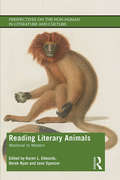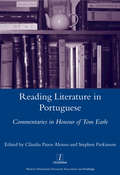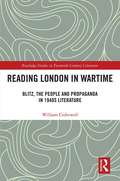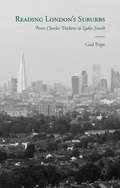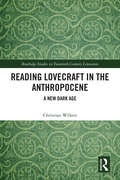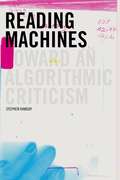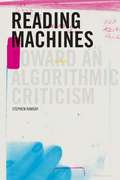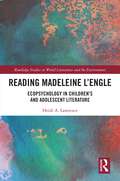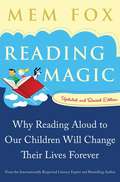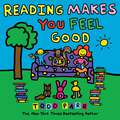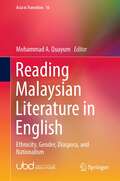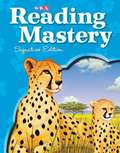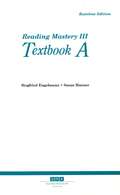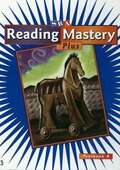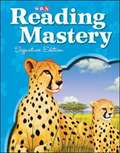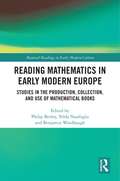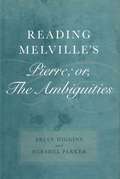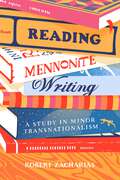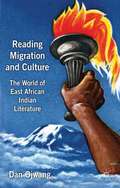- Table View
- List View
Reading Literary Animals: Medieval to Modern (Perspectives on the Non-Human in Literature and Culture)
by Jane Spencer Derek Ryan Karen EdwardsReading Literary Animals explores the status and representation of animals in literature from the Middle Ages to the present day. Essays by leading scholars in the field examine various figurative, agential, imaginative, ethical, and affective aspects of literary encounters with animality, showing how practices of close reading provoke new ways of thinking about animals and the texts in which they appear. Through investigations of works by Shakespeare, Aphra Behn, William Wordsworth, Charles Dickens, Virginia Woolf, and Ted Hughes, among many others, Reading Literary Animals demonstrates the value of distinctively literary animal studies.
Reading Literature in Portuguese
by Claudia Pazos Alonso"This collection brings together textual commentaries on thirty representative works of literature in Portuguese - either complete poems or extracts from longer works - ranging from the medieval lyric of the 13th century, through the poetry and drama of the Portuguese Renaissance, the great Realist novels of the nineteenth century, early twentieth century Modernism and post-1974 writings through to the present day, while also including examples of 19th- and 20th- century Brazilian literature. The authors chosen - poets, dramatists and novelists - are generally regarded as iconic writers, and the three most famous canonical Portuguese authors (Luis de Camoes, Fernando Pessoa, Jose Saramago) are featured, but the texts selected for commentary strike a balance between a focus on well-known and lesser-studied works. All the primary texts are reproduced in Portuguese, sometimes in original editions, with English translations added for the majority. The contributors variously explicate and contextualise the works they present, some focusing on hidden meaning, others on philological aspects of editing, others on their historical, intellectual and philosophical context, and others still on the process of translation itself. All, however, aim to develop the art of reading, for the benefit of scholars and students alike. Stephen Parkinson and Claudia Pazos Alonso are members of the Sub-Faculty of Portuguese at Oxford University, and editors of the Companion to Portuguese Literature (Tamesis, 2009)."
Reading Literature: Fiction, Poetry, and Exercises Based on Common Core State Standards
by Prestwick HouseA language arts textbook for level 9
Reading London in Wartime: Blitz, the People and Propaganda in 1940s Literature (Routledge Studies in Twentieth-Century Literature)
by William CederwellReading London in Wartime: Blitz, the People and Propaganda in 1940s Literature presents an expansive variety of writers and genres, including non-fiction and film approaches, to build a comprehensive social picture of the atmosphere during wartime London. From blitz and austerity to the nagging insistency of propaganda, this volume examines the representation of London in wartime and early post-war literature through each writer’s unique perspective on the pressures of 1940s city life. Exploring the use of London imagery, this book considers how literature redirects attention to individual, subjective experience at a time of enforced co-operation, uniformity and community. Unlike government information films and news broadcasts, which often used London to prop up prevailing clichés and stereotypes, and encouraged patriotic support for the war, literature had the freedom to express more recalcitrant truths. London writing of the 1940s was not a literature of opposition or dissent, but in offering more nuanced depictions of the period, it was a counterweight to propaganda and the general war temperament. In writing, the city becomes a more complex place, no longer the easy symbol of defiance and stoicism, of the shared sacrifice of ration book and war work.
Reading London’s Suburbs
by Ged PopeA study of London suburban-set writing, exploring the links between place and fiction. This book charts a picture of evolving themes and concerns around the legibility and meaning of habitat and home for the individual, and the serious challenges that suburbia sets for literature.
Reading Lovecraft in the Anthropocene: A New Dark Age (Routledge Studies in Twentieth-Century Literature)
by Christian WilkenIn Reading Lovecraft in the Anthropocene: A New Dark Age, the intersection of environmental, philosophical, and literary discourses is explored through the lens of H.P. Lovecraft’s weird fiction. This study examines the convergence of three critical phenomena: the widespread recognition of the Anthropocene as a marker of human impact on the planet, the rise of speculative realism and Object-Oriented Ontology (OOO) in contemporary philosophy, and the growing cultural and academic influence of Lovecraft’s work.Divided into three parts – “Seeds,” “Crops,” and “Excrescence” – the book traces Lovecraft’s gothic and decadent influences, examines materiality and its transcendence in weird fiction, and considers the posthuman and postsecular dimensions of his narratives. Through this, the study highlights Lovecraft’s role in navigating the challenges of a secular, disenchanted world, offering a “dark enchantment” that echoes current philosophical concerns.This work ultimately synthesizes discussions on weird fiction as a response to the existential and ecological crises of the Anthropocene, addressing issues like correlationism, anthropocentrism, and our fraught relationship with the natural world.
Reading Machines: Toward an Algorithmic Criticism
by Stephen RamsayStephen Ramsay's intriguing study of computational text analysis examines how computers can be used as "reading machines" to open up entirely new possibilities for literary critics. Computer-based text analysis has been employed for the past several decades as a way of searching, collating, and indexing texts. Despite this, the digital revolution has not penetrated the core activity of literary studies: interpretive analysis of written texts. Computers can handle vast amounts of data, allowing for the comparison of texts in ways that were previously too overwhelming for individuals, but they may also assist in enhancing the entirely necessary role of subjectivity in critical interpretation. Reading Machines discusses the importance of this new form of text analysis conducted with the assistance of computers. Ramsay suggests that the rigidity of computation can be enlisted in the project of intuition, subjectivity, and play.
Reading Machines: Toward and Algorithmic Criticism (Topics in the Digital Humanities)
by Stephen RamsayBesides familiar and now-commonplace tasks that computers do all the time, what else are they capable of? Stephen Ramsay's intriguing study of computational text analysis examines how computers can be used as "reading machines" to open up entirely new possibilities for literary critics. Computer-based text analysis has been employed for the past several decades as a way of searching, collating, and indexing texts. Despite this, the digital revolution has not penetrated the core activity of literary studies: interpretive analysis of written texts. Computers can handle vast amounts of data, allowing for the comparison of texts in ways that were previously too overwhelming for individuals, but they may also assist in enhancing the entirely necessary role of subjectivity in critical interpretation. Reading Machines discusses the importance of this new form of text analysis conducted with the assistance of computers. Ramsay suggests that the rigidity of computation can be enlisted in the project of intuition, subjectivity, and play.
Reading Madeleine L’Engle: Ecopsychology in Children’s and Adolescent Literature (Routledge Studies in World Literatures and the Environment)
by Heidi A. LawrenceUsing a critical lens derived from ecopsychology and its praxis, ecotherapy, this book explores the relationships Madeleine L’Engle develops for her characters in a selection of the novels from her three Time, Austin family, and O’Keefe family series as those relationships develop along a human-nonhuman kinship continuum. This is accomplished through an examination both of pairs of novels from the fantastic and the realistic series, and of single novels which stand out as slightly different from the most prominent genre in a given series. Thus, this examination also shows L’Engle’s fluid movement along a fantasy-reality continuum and demonstrates the integration of the three series with each other. Importantly, through examining these relationships and this movement along continuums in these novels, the project demonstrates how ecopsychology and ecotherapy provide strong and important – and as-yet virtually unexplored – intersections with children’s literature.
Reading Magic: Why Reading Aloud to Our Children Will Change Their Lives Forever
by Mem FoxWith passion and humor, Fox speaks of when, where, and why to read aloud and demonstrates how to read aloud to best effect and get the most out of a read-aloud session. She discusses the three secrets of reading, offers guidance on defining and choosing good books.
Reading Makes You Feel Good
by Todd ParrReading makes you feel good because. . . You can imagine you are a scary dinosaur, You can make someone feel better when they are sick, And you can do it anywhere! Reading Makes You Feel Good will inspire and encourage young children to delight in the joyful, rewarding experience of reading. With Todd Parr's trademark bright, bold pictures and silly scenes, kids will learn that reading isn't something that just happens at school or at home-it can happen anywhere! Todd shows us all the fun ways we can read- from in the library and in bed to in the bathtub and on the road. Targeted to those first beginning to read, this book invites children to read the main text as well as all the funny signs, labels, and messages hidden in the pictures. Along with the four other bestselling Todd Parr picture books debuting in paperback this season, Reading Makes You Feel Good is designed to encourage early literacy, enhance emotional development, celebrate multiculturalism, and promote character growth.
Reading Malaysian Literature in English: Ethnicity, Gender, Diaspora, and Nationalism (Asia in Transition #16)
by Mohammad A. QuayumThis book brings together fourteen articles by prominent critics of Malaysian Anglophone literature from five different countries: Australia, Italy, Malaysia, Singapore, and the US. It investigates the thematic and stylistic trends in the literary products of selected writers of the tradition in the genres of drama, fiction, and poetry, from its beginnings to the present, focusing mainly on the postcolonial themes of ethnicity, gender, diaspora, and nationalism, which are central to the creativity and imagination of these writers. The book explores the works of not just the established writers of the tradition but also those who have received little critical attention to date but who are equally gifted, such as Adibah Amin, Edward Dorall, Rehaman Rashid, and Huzir Suleiman. The chapters collectively address the challenges and achievements of writers in the English language in a country where English is widely used in daily life and yet marginalised in the creative domain to elevate the status of writings in the national language, i.e., Bahasa Malaysia. The book will demonstrate that in spite of such recurrent neglect of the medium, Malaysia has produced a number of outstanding writers in the language, who are comparable in creativity and craftsmanship to writers of other Anglophone traditions. The book will be of interest to readers and researchers of Malaysian literature, postcolonial literatures, minority literatures, gender studies, and Southeast Asian studies.
Reading Mastery Grade 3: Textbook A
by McGraw-Hill SRA StaffReading Mastery textbooks are included in student materials focusing on helping students become fluent, accurate readers.
Reading Mastery III, Textbook A, Rainbow Edition
by McGraw HillText books provide skill and comprehension activities and shape students' ability to work independently
Reading Mastery Plus: Textbook B, Grade 3
by EngelmannReading Mastery Plus gives students the skills and the clear, explicit instruction and guidance they need to master the fundamentals of reading. Oral language, phonemic awareness, and systematic phonics are the starting point. Vocabulary development, fluency, and comprehension are fundamental throughout. <p>Grade 3
Reading Mastery: Literature Anthology
by McGraw-Hill SRA StaffLiterature Collection and Guide (Grades K and 1) expand on skills students are learning in Reading Mastery Signature Edition.
Reading Mastery: Textbook B
by McGraw-Hill SRA StaffReading Mastery textbooks are included in student materials focusing on helping students become fluent, accurate readers.
Reading Mastery: Workbook B
by McGraw-HillWorkbooks provide skill and comprehension activities and shape students' ability to work independently.
Reading Mathematics in Early Modern Europe: Studies in the Production, Collection, and Use of Mathematical Books (Material Readings in Early Modern Culture)
by Philip Beeley, Yelda Nasifoglu and Benjamin WardhaughLibraries and archives contain many thousands of early modern mathematical books, of which almost equally many bear readers’ marks, ranging from deliberate annotations and accidental blots to corrections and underlinings. Such evidence provides us with the material and intellectual tools for exploring the nature of mathematical reading and the ways in which mathematics was disseminated and assimilated across different social milieus in the early centuries of print culture. Other evidence is important, too, as the case studies collected in the volume document. Scholarly correspondence can help us understand the motives and difficulties in producing new printed texts, library catalogues can illuminate collection practices, while manuscripts can teach us more about textual traditions. By defining and illuminating the distinctive world of early modern mathematical reading, the volume seeks to close the gap between the history of mathematics as a history of texts and history of mathematics as part of the broader history of human culture.
Reading Melville's Pierre; or, The Ambiguities: A Reading of the Poems (Southern Literary Studies)
by Hershel Parker Brian HigginsHerman Melville's Pierre; or. The Ambiguities has a storied place in the history of American publishing. Melville began writing this follow-up to Moby-Dick in October 1851, thinking that it might prove even more significant than its predecessor. The 1852 publication of Pierre was catastrophic, however. Melville lost his English publisher, and American reviewers derided the book and called the author mad. InReading Melville's "Pierre; or, The Ambiguities," noted Melville authorities Brian Higgins and Hershel Parker probe the daunting story behind a deeply flawed but revealing work, one that directly reflects the major crisis of Melville's authorial life.Weighed down by huge debts, Melville took the manuscript of Pierre to his New York publisher, Harper and Brothers, desperately needing the new work to be a financial success. The Harpers balked at publishing such a dangerous psychological novel (incest was a theme) and offered him less than half the royalties they had paid for his previous books. The anguished Melville accepted the contract but subsequently added new passages to his manuscript -- passages that disparage the publishing industry and reflect his agony at the looming loss of his career.Higgins and Parker examine what can plausibly be reconstructed of Melville's original version of Pierreand explore the consequences of his belated decision to expand his work, showing in detail how his hastily written and awkwardly inserted additions marred much of what he had brilliantly achieved in the shorter version. They demonstrate that to understand Pierre, and Melville himself at this crisis, one must first understand the compositional history that resulted in the book as published.Setting Pierre in the context of Melville's literary life, Higgins and Parker's study is an illuminating demonstration of biographical and textual scholarship by two of the field's finest practitioners.
Reading Memory And Identity In The Texts Of Medieval European Holy Women
by Brad Herzog Margaret Cotter-LynchDrawing upon much of the recent scholarly interest in the nature and uses of memory, this collection of essays examines a range of texts commemorating European holy women from the ninth through fifteenth centuries. The contributors explore the relationship between memorial practices and identity formation in two ways: first, by showing how women drew upon traditions and memories in fashioning their own lived lives; and secondly, by showing how both male and female authors used medieval memory arts to portray those lives for contemporary and future audiences. This book will interest scholars of medieval literature, medieval religious history, feminist scholars, and historians of rhetoric.
Reading Memory in Early Modern Literature
by Andrew Hiscock'He who remembers or recollects, thinks' declared Francis Bacon, drawing attention to the absolute centrality of the question of memory in early modern Britain's cultural life. The vigorous debate surrounding the faculty had dated back to Plato at least. However, responding to the powerful influences of an ever-expanding print culture, humanist scholarship, the veneration for the cultural achievements of antiquity, and sweeping political upheaval and religious schism in Europe, succeeding generations of authors from the reign of Henry VIII to that of James I engaged energetically with the spiritual, political and erotic implications of remembering. Treating the works of a host of different writers from the Earl of Surrey, Katharine Parr and John Foxe, to William Shakespeare, Mary Sidney, Ben Jonson and Francis Bacon, this study explores how the question of memory was intimately linked to the politics of faith, identity and intellectual renewal in Tudor and early Stuart Britain.
Reading Mennonite Writing: A Study in Minor Transnationalism
by Robert ZachariasMennonite literature has long been viewed as an expression of community identity. However, scholars in Mennonite literary studies have urged a reconsideration of the field’s past and a reconceptualization of its future. This is exactly what Reading Mennonite Writing does.Drawing on the transnational turn in literary studies, Robert Zacharias positions Mennonite literature in North America as "a mode of circulation and reading" rather than an expression of a distinct community. He tests this reframing with a series of methodological experiments that open new avenues of critical engagement with the field’s unique configuration of faith-based intercultural difference. These include cross-sectional readings in nonnarrative literary history, archival readings of transatlantic multilingual diaries, Canadian rewritings of Latin American film’s deployment of Mennonite theology as fantasy, an examination of the fetishistic structure of ethnicity as a "thing" that has enabled Mennonite identity to function in a post-identity age, and, finally, a tentative reinvestment in ideals of Mennonite community via the surprising routes of queerness and speculative fiction. In so doing, Zacharias presents Mennonite fiction, poetry, and film criticism in North America as a useful case study in the shifting position of minor literatures in the wake of the transnational turn.Theoretically sophisticated, this study of minor transnationalism will appeal to specialists in Mennonite literature and to scholars working in the broader field of transnational literary studies.
Reading Mennonite Writing: A Study in Minor Transnationalism
by Robert ZachariasMennonite literature has long been viewed as an expression of community identity. However, scholars in Mennonite literary studies have urged a reconsideration of the field’s past and a reconceptualization of its future. This is exactly what Reading Mennonite Writing does.Drawing on the transnational turn in literary studies, Robert Zacharias positions Mennonite literature in North America as “a mode of circulation and reading” rather than an expression of a distinct community. He tests this reframing with a series of methodological experiments that open new avenues of critical engagement with the field’s unique configuration of faith-based intercultural difference. These include cross-sectional readings in nonnarrative literary history; archival readings of transatlantic life writing; Canadian rewritings of Mexican film’s deployment of Mennonite theology as fantasy; an examination of the fetishistic structure of ethnicity as a “thing” that has enabled Mennonite identity to function in a post-identity age; and, finally, a tentative reinvestment in ideals of Mennonite community via the surprising routes of queerness and speculative fiction. In so doing, Zacharias reads Mennonite writing in North America as a useful case study in the shifting position of minor literatures in the wake of the transnational turn.Theoretically sophisticated, this study of minor transnationalism will appeal to specialists in Mennonite literature and to scholars working in the broader field of transnational literary studies.
Reading Migration and Culture
by Dan OjwangThis book uses the uniquely positioned culture of East African Asians to reflect upon the most vexing issues in postcolonial literary studies today. By examining the local histories and discourses that underpin East African Asian literature, it opens up and reflects upon issues of alienation, modernity, migration, diaspora, memory and nationalism.
